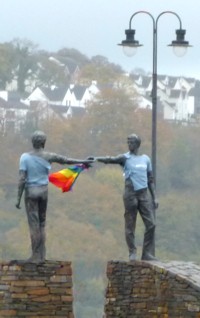In October 2018 we travelled to Ireland. Later we would go on to England (the south coast and London) before travelling overland (and underwater) by rail to Belgium and then on to Berlin to visit our grandchildren there.
The island of Ireland is not very big, about a quarter as large again as Tasmania, with a population not much bigger than Sydney (4.75 million in the Republic of Ireland with another 1.85 million in Northern Ireland). So it's mainly rural and not very densely populated.
It was unusually warm for October in Europe, including Germany, and Ireland is a very pleasant part of the world, not unlike Tasmania, and in many ways familiar, due to a shared language and culture.
Our Travels
We had a simple plan. We would hire a car in Dublin and drive around the island in an anti-clockwise fashion to Belfast, stopping at points of interest, as recommended by friends, the tour brochures and the Internet travel apps.
To minimise the number of hotels we would spend several nights in some places and use those as a base for day trips to nearby points of interest. With three days in the two largest cities (Dublin and Belfast) at the beginning and the end we decided the two weeks would be sufficient for an introduction.
We resolved to find middle priced accommodation with parking in the following locations.
| City/Town | County |
| Dublin Waterford Kinsale (for the Cork area) Killarney (for the Dingle area) Galway Sligo Derry Bushmills (for Portrush area) Belfast |
Dublin Waterford Cork Kerry Galway Sligo Londonderry (UK) Antrim (UK) Antrim & Down (UK) |
Wendy had been to Ireland over forty years ago but it's a different country now.
Today Ireland is an easy country to drive in. They have similar road rules to Australia, so there isn't that alarm exiting a driveway one has in Europe or North America: 'Damn! What side of the road am I supposed to be on?' The roads are generally very good. Highways, that we often avoided, are like those in England or Australia and local roads are mostly two lanes finished in smooth black hot-mix. The speed limit on these is typically 100 Km/h limit, except through towns, and we didn't encounter much slow traffic, for example tractors. The longest driving time between the towns listed above was two and a half hours. Several were only an hour apart, so we had plenty of time to stop at a view or to find a pub or cafe for lunch; or on one occasion to shop for grandchild requested Lego.
Unfortunately the Seat Toledo* we'd hired in Dublin was unaware of the antiquated system of mensuration in the North (there was no mph marking on the speedo) so we had to rely on Tom Tom (our invaluable worldwide GPS) to stay within the speed limits. Another issue for the unwary traveller is that Northern Ireland is not in the Euro zone, so it's a good idea to have some Irish or English pounds when crossing the border. Of course one can simply use a credit card for essential things, like petrol.
Yet I came to grief attempting to use some very old one pound coins, brought from a stash home, and even a relatively recent five pound note. The Bank of England has finally seen the light, only thirty years after Englishmen first mocked Australia's colourful 'plastic money'. Britain is at last progressively withdrawing its old fashioned paper money from circulation. A bank in Derry happily replaced the paper notes with plastic ones but not the coins.
When travelling my principal goal is not to lie on a beach; hang out in a luxury hotel; or get close to nature; but to learn more of the history of the place; its people; and their beliefs. Wendy is even keener to get out among the locals.
|
*The Car - for those interested only We hired the car, well in advance, from AVIS in Dublin. They were the only company we found there that allowed us to drop it off in Belfast (in a different country). I'd not driven a Seat before - it's a Spanish VW - described in one review as: "the automotive equivalent of a Bosch dishwasher: well made, utterly functional and entirely devoid of character." It lacked 'bells and whistles like self-parking and the Sat-nav was disabled, but it was more roadworthy and comfortable than many other cars we've hired while travelling. With a 1.2-litre petrol engine and a five-speed manual gearbox it was light on fuel, that's expensive in Ireland. Yet mountainous winding roads, leafy, slippery lanes and overtaking were not a problem. Even on a stretch of boggy unmade farm road, that TomTom had led us onto as a 'shortcut' after missing a turn, the Toledo ploughed on. It even took a steep climb over a grassy bank out onto the made road, obviating the imminent need to find a farmer to extricate us. We had a flashback to Sicily. But the best thing was a big boot, that took both the big bags and the small ones too.
|

